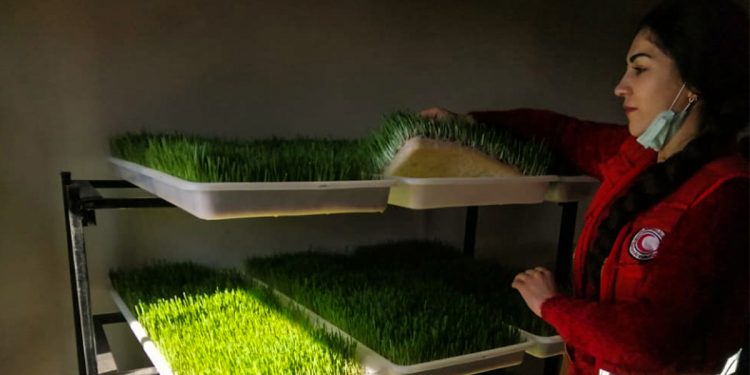New project offers an economical alternative to fodder to support livestock breeders
The protection and enhancement of the livelihoods of livestock keepers within the northern countryside of Sweida Governorate, is an essential foundation that determines whether stock-breeding continues or stops. And to support its continuity, the Syrian Arab Red Crescent volunteers presented the Feed Project, which will help farmers produce low-cost fodder through hydroponic fodder production units.
The project’s inputs consist of (10 plastic trays with its holder, 650 kg of compound feed, and 200 kg of barley seeds whose sprouts are used as fresh fodder), and they were distributed on 220 livestock farmers in the villages of ( Um hartin – Alsawara Alzaghira – Khulkhlah -Hazm – Radhima Al liwa).
Hydroponic fodder project helps (Akram) double his production
With his strong determination, Akram, a stockbreeder from Khulkhleh village , could overcome the problems of high costs and scarcity of fodder, after he succeeded in producing fodder hydroponically, thanks to the fodder grant he received from the Syrian Arab Red Crescent.
“What a wonderful project, it saved us much money and effort”, the 60 year-old man expresses his happiness with the results of the project, which helped him increase the number of his sheep from 12 to 22, as each kg of barley seeds produces 8 kg of fresh fodder.
Last season, Akram was able to produce 280 kg of milk and make several varieties of dairy products, he sold most of them, and saved the rest for the next winter. He also explains that if it wasn’t for this grant, he would have been forced to sell a part of his livestock to be able to feed the remaining sheep.
The goal of the fodder grants is to safeguard livestock, by helping farmers produce hydroponic fodder, and providing them with technical support and periodic follow-ups, knowing that these grants are distributed with the support of #InternationalCommitteeoftheRedCross.

